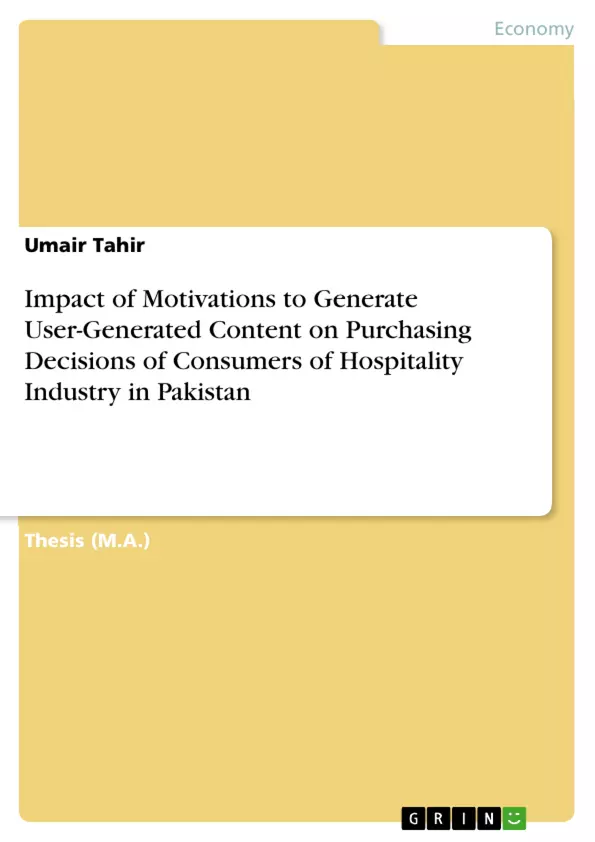Social networking has become a vital component of the current era which is not only being utilized by the public but also the corporate sector is using it for marketing purposes. The success of social web as a marketing tool is because of its enormous usage and it bears minimum cost to the firms. Over the past few decades the use of personal computers and laptops has increased dramatically. Moreover the use of Internet and the social websites is progressing among the users. Different business companies are taking the advantage of this trend and are using social network as a vehicle to reach millions of their customers and repeat buyers. For industry such as hospitality industry where it is extremely important to stay in touch with customers constantly and provide them latest updates regarding the services, social networking sites are being considered one of the most effective and efficient tool. However the corporate firms are not utilizing this platform to its maximum level and there is still lot more potential that has to explored and understood. The purpose of this study is to evaluate the effect of the customer/user generated advertisement on the hospitality industry and analyze the different marketing strategies being implemented by the organizations to reach masses of their customers. The paper will explain the factors influencing the consumer’s purchase intention and brand loyalty.
The objective of the research paper is not only to calculate the number of hospitality firms using the social network actively but analyze the different sectors and functions of the social media being implemented by the industry for advertisement. The research paper also explains the advantage of using the social networking sites for advertisement as compared to the traditional advertising. The study will reveal which consumers are our most profitable segment which we need to go for. The study will explain the factors which are considered most important by consumers and hence the industry should focus its marketing efforts on these factors.
Inhaltsverzeichnis (Table of Contents)
- Chapter 1: Introduction
- Purpose of Study
- Significance of Study
- Problem Statement
- Definition of Important Terms
- Chapter 2: Literature Review
- E-commerce
- Web 2.0
- Online Community
- Online Shopping
- Consumer Behavior
- User Generated Content
- Social Networking Sites
- Word of Mouth Communication
- Theoretical Framework
- Chapter 3: Research Methodology
- Research Variables
- Hypothesis Development
- Survey Instrument
- Chapter 4: Data Analysis
- Chapter 5: Conclusions and Recommendations
- Findings of the Study
- Practical Implications
- Recommendations for Further Study
- Limitations
Zielsetzung und Themenschwerpunkte (Objectives and Key Themes)
This study aims to investigate the impact of user-generated content (UGC) on purchasing decisions of consumers in the hospitality industry in Pakistan. It analyzes the different marketing strategies employed by hospitality firms to leverage social media platforms and explore the factors influencing consumer purchase intention and brand loyalty.
- Impact of user-generated content on purchasing decisions in the hospitality industry
- Marketing strategies implemented by hospitality firms on social media
- Factors influencing consumer purchase intention and brand loyalty in the context of UGC
- Comparison of social media advertising with traditional methods
- Identifying profitable consumer segments for targeted marketing efforts
Zusammenfassung der Kapitel (Chapter Summaries)
Chapter 1 introduces the topic of study, outlining the purpose, significance, problem statement, and defining key terms related to user-generated content and its impact on consumer behavior in the hospitality industry. Chapter 2 delves into the literature review, examining concepts such as e-commerce, Web 2.0, online communities, consumer behavior, and the role of social media platforms in shaping purchasing decisions. It also introduces the theoretical framework guiding the research.
Chapter 3 outlines the research methodology, including the variables studied, hypothesis development, and the survey instrument used for data collection. Chapter 4 focuses on the data analysis, utilizing SPSS to analyze the collected data and draw insights. Finally, Chapter 5 presents the conclusions of the study, highlighting the findings, practical implications, recommendations for further research, and acknowledging limitations.
Schlüsselwörter (Keywords)
The study revolves around the key concepts of user-generated content (UGC), social media marketing, consumer behavior, purchase intention, brand loyalty, hospitality industry, and Pakistan. It explores the influence of UGC on consumer decisions in the hospitality sector, analyzes the effectiveness of social media advertising, and examines the factors contributing to consumer loyalty and purchase behavior within this context.
Frequently Asked Questions
What is User-Generated Content (UGC)?
UGC refers to any form of content, such as reviews, photos, or videos, created by users of a service or product and shared on social media or travel platforms.
How does UGC affect hotel bookings in Pakistan?
The study suggests that online reviews and user-generated advertisements significantly influence consumer purchase intentions and brand loyalty in the Pakistani hospitality industry.
Is social media marketing cheaper than traditional advertising?
Yes, social web marketing is considered highly effective because it reaches a global audience at a much lower cost compared to traditional media like TV or print.
What is the role of Word of Mouth (WOM) in hospitality?
Online Word of Mouth (eWOM) through social networking sites acts as a powerful recommendation engine that builds trust and influences the decisions of potential guests.
What factors are most important to hospitality consumers?
Consumers prioritize transparency, real-time updates on services, and authentic feedback from other travelers when making purchasing decisions.
- Quote paper
- Umair Tahir (Author), 2014, Impact of Motivations to Generate User-Generated Content on Purchasing Decisions of Consumers of Hospitality Industry in Pakistan, Munich, GRIN Verlag, https://www.grin.com/document/299074



